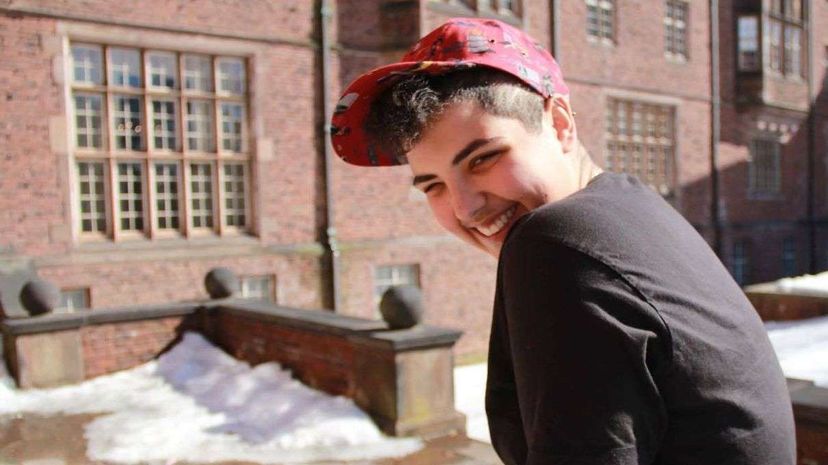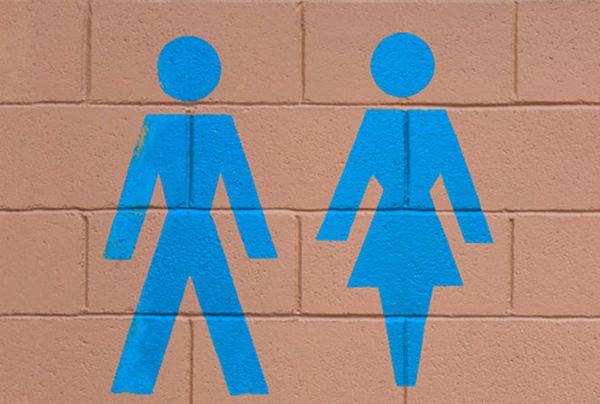
Back in 2012, Georgia resident Roddy Jacobson, enrolled at Mount Holyoke, a prestigious all-women's college in South Hadley, Massachusetts. While there, Jacobson, who was assigned female at birth, thought about transitioning to a male identity.
"I think I was dealing with interpersonal issues, and some of them were in relation to being at this 'all-women's environment' and not feeling any connection to that identity beyond biological parts," Jacobson says, later specifying the feelings as disillusionment. "My sophomore year I was approached by a few trans guys on campus and they invited me to some events. I got into the small trans circles on campus. I opened my mind up about my gender [identity] through that."
Advertisement
Jacobson now identifies as nonbinary (meaning their gender identity does not fall neatly within the binary of woman or man) and uses gender-neutral pronouns "they", "them" and "their." While at Mount Holyoke, meeting other transgender students and learning about the gender spectrum changed their college experience.
Single-sex colleges now are grappling with the issue of who exactly can be admitted to what is traditionally termed an "all-men's" or "all-women's" college. Some institutions already have changed their policies. Though schools may think this is an issue for them to decide, experts say the law already allows trans students to be admitted.
In 2014, the United States Department of Education issued a statement clarifying that transgender students are protected by Title IX, a federal civil rights law banning sex discrimination in federally funded programs.
"Title IX's sex discrimination prohibition extends to claims of discrimination based on gender identity or failure to conform to stereotypical notions of masculinity or femininity and OCR [U.S. Office of Civil Rights] accepts such complaints for investigation," the statement reads in part.
Mount Holyoke was the first of the "Seven Sisters," a collection of prestigious historically women's U.S. colleges, to amend its admissions policy to admit trans women, and its policy is one of the broadest. It lists seven categories of eligibility:
1. Biologically born female; identifies as a woman
2. Biologically born female; identifies as a man
3. Biologically born female; identifies as other/they/ze
4. Biologically born female; does not identify as either woman or man
5. Biologically born male; identifies as woman
6. Biologically born male; identifies as other/they/ze and when "other/they" identity includes woman
7. Biologically born with both male and female anatomy (Intersex); identifies as a woman
The only category of students who cannot be admitted are those biologically born male who identify as men.
Gender Flux
The education system remains one of the largest battlegrounds for equality. While the public hears more about issues relating to trans students in the public school system (like bathroom and locker room usage), another big problem is acceptance to "single-gender" or "single-sex" colleges.
A major part of the problem has been expanding long-held definitions on what it means to be a man or a woman, as well as a growing understanding that, for some people, gender doesn't live within this binary system, but rather comprises a spectrum of identities.
In August 2014, Mills College became the first single-sex college to adopt a transgender admissions policy definitively admitting prospective and current students that were assigned female at birth or currently identify as women. Following this lead, Mount Holyoke also changed its policy, effectively setting a standard for the nearly 50 all-women's colleges in the U.S. (All "Seven Sisters" schools changed their policies within a year.) We contacted the Women's College Coalition to see if it had information on how many members had revised their admissions policy, but a spokesperson says this is not something they tracked.
A New Normal
Implementing an inclusive admissions policy hasn't been easy for single-sex schools steeped in decades (or centuries) of tradition. From crafting policies for students to be respected by their chosen names and pronouns even if they haven't had them legally changed to educating professors of the old guard on best practices, there's often a steep learning curve, even on progressive campuses.
"[Mount Holyoke] is getting better, but I think progress is slow," Jacobson says, though they add that the atmosphere was mostly affirming. They also explained why trans students would want to attend single-sex schools.
"I think the desire to attend [women's colleges] stems from them typically coming from a liberal, seemingly open-minded space. Most of these colleges have a lot of focus on social justice activism and so the spaces themselves try to be welcoming to all sorts of identities," Jacobson says. "I also think that they attract students who may not know that they're questioning their gender because these communities are able to thrive because they're an oasis from the outside world."
At the Other End of the Spectrum
Men's colleges are an entirely different obstacle for prospective trans students. The three non-religious, four-year, all-male colleges in the U.S. — Hampden–Sydney, Morehouse and Wabash — haven't made official statements on the acceptance of transgender students.
Morehouse, a historically black college, has been in the media in recent years for its increasingly visible gender nonconforming and trans feminine community. At an institution known for shaping and fostering a space for black manhood, these students have been at odds with the school's mission.
Attempts to speak to the staff at Morehouse were unsuccessful; however, a representative from the school's public relations department says the school's administration is working on crafting an official policy.
Jason Ferguson, the admissions director at Hampden-Sydney College, was much more willing to share the school's thoughts on transgender inclusion.
"Our policy in regards to all students is that the student must be legally designated as male in order to apply and be admitted to the college. I realize that that is subject to some discussion. Let's say a birth certificate, driver's license, high school transcript designation anything to say the student is male is a prerequisite for the men's college," he says.
Though Hampden-Sydney has developed an informal policy, the school hasn't admitted any openly transgender students thus far. Ferguson recalls an instance in which an alumna of the school needed the information on her school records changed to reflect her new identity, and the staff obliged with no issues. However, there seems to be some discussion of how this policy would play out with an actual transgender student on campus.
"If the student enrolled as a residential student and made the transition, we have residential halls on campus where students could have their own room and bathroom. That'd be an easy thing to accomplish," Ferguson says.
On the surface, this seems like an adequate response. But Title IX doesn't make stipulations on what counts as a valid transition or the use of extensive documentation to prove a student's gender.
Learning Curve
Ferguson, like many school officials around the U.S., believes that prospective trans students must prove their gender transition in order to qualify for their schools, but that's not necessarily the case.
"Title IX is pretty clear that you can't require that someone's gender identity be validated on legal contingencies or medical requirements. I think that's just the reality of schools not always being as far along as what the law requires," Alison Pennington, a staff attorney at the Transgender Law Center, says. "It's one of the reasons why we push schools to go ahead and enact these policies, because once these issues are looked into, the law is very clear about what's required."
Pennington says that the number of colleges with clear policies is growing; however, she understands that the process of updating every school and the entire education system will take time.
"The law is really clear, but that being said it doesn't always trickle down to practice and policy," she says. "I don't think that's unusual for schools and institutions to still be in the process of thinking about and drafting their policies."
Though Title IX may seem to be a cure-all, it's noticeably silent on how nonbinary students, (those who don't identify within the male/female dichotomy) fare in school policy expansions. It's one thing to accept someone as a man or woman, but what if their identity isn't that clear-cut?
"Title IX ... is not just protecting transgender students, but also students who are gender non-conforming or don't subscribe to sex stereotyping which could apply to non-binary individuals," Pennington says. "Title IX has not spoken as clearly on non-binary issues when it comes to use of facilities. There is tremendous room for growth in terms of legal protections for non-binary folks and the law is a lot less clear in that area."
After a time at Mount Holyoke, Jacobson transferred to Georgia State University, a large coeducational institution in Atlanta. "The reasons I left weren't necessarily correlated to being trans. I needed to go and spread my wings," Jacobson explains. "I learned so much about womanhood and femininity that I really respect and still identify with. Mount Holyoke was one of the most formative experiences I've had, so I don't think I can imagine my life without it."
Advertisement
